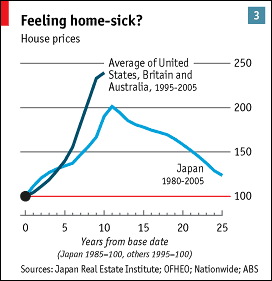
Here's Wikipedia's write up of the US bubble and the Japan bubble. Good reading.
USA! USA! USA!
June 10, 2006
What'll be worse - the US Housing Bubble 2000 - 2005 or the Japanese Asset Bubble 1986 - 1990?
Posted by
blogger
at
6/10/2006
![]()
![]()
Subscribe to:
Post Comments (Atom)



6 comments:
That graph raises a good point about how it will end. I've been seeing 2 camps emerging in the bubble-blogosphere.
One camp believes that prices will plummets suddendly and swiftly, making everything normal again. These are your ex-flippers, vulture buyers, etc that recently stopped listening to NAR.
Then you have the theory that this graph dictates, the plummet plus 5-10 years of steady declines.
I'm leaning toward the second theory. After the flipppers get fried, it will be the weekend seminar vulture buyers croaking a slow death as the smart money is completely out of real estate.
Differences between Japan and US:
(*) Japan had a simultaneous stock market and real estate bubble.
US does not, because P/E's of major stocks are not excessively outside historical norms the way they were in 2000.
(*) Japanese have a fanatical savings rate and major export-induced merchandise surplus.
(*) Japanese businesses and banks were unable to write off loans as quickly for legal and cultural reasons.
Japan is now recovering, but despite their generally better true economy their government debt is titanic, more than the US's.
(*) In 1990, their government debt was pretty small, unlike the US.
(*) Japan has the advantage that their citizens were not as profligate in other debt (government/credit card) before the bubble.
(*) US has the advantage of a more flexible and modern financial system, enabling write-downs faster.
(*) Japan has the large advantage of making hard products foreigners want to buy, so even as their domestic-based assets went in a bubble the owners were also domestic based so the nation only had to sort-out things inside their system, which is homogeneous and willing to sacrifice for each other's welfare to a greater extent.
(*) Japan has the advantage that it didn't, at least within two generations, go around really pissing off foreigners who might help it.
(*) Japan had the advantage of an excellent domestic capital infrastructure.
(*) Japan had the advantage of trying to come back in a decade of generally global peace, prosperity, and most importantly, cheap oil. The US will face the terminal oil crisis of peak oil.
Anon,
I gather you think it will be different this time?
Which camp are you in. It sounds like your in camp one from the original post but I am unsure?
I'm not sure I'm in the "same" or "different" camp.
The reality was that in Japan the popping of their bubble wasn't evidently manifested at a really fundamental gut level during the 1990's.
I remember people in the US who had been hearing about how bad Japan was, yadda yadda, astonished to see how extremely wealthy the people and society appeared to be when they actually travelled there in the middle of the supposed crisis. There was no big breakdown, and unemployment went from perhaps a 2% to 3 or 4%. Shocking by Japanese standards but really nothing.
My feeling is that the crunch will come faster and harder than in Japan. There will be large social dislocation primarily because a number of people and many companies will still be very prosperous still, and yet many others will be profoundly screwed and they will be very angry.
The political climate in the US is now so poisoned by personal hatreds and recriminations that never existed in Japan since their fascist days that I wonder whether sensible economic recovery could happen.
What happens when oil hits $175 in the depths of 11% (optimistic BLS figure) unemployment?
I bet the Right will be quick to blame Godless Liberals for absolutely everything and prescribe Hoovernomics combined with More Militarism 101. "Prosperity through superior firepower".
The Left will blame consumerist capitalist propaganda combined with jingoistic militarism and oil dependency.
If you want to be informed (and very depressed) about realites of oil, check out
www.energybulletin.net
The arguments by cornucopians that oil sands and alternative energy will come to the rescue are quantitatively laughable.
Sorry but you've missed one HUGE difference between the U.S. and Japanese economies. The yen was not the world's reserve currency when their deflationary spiral took hold.
Central bankers around the world can't simply "dump" their dollars because there is no other universal medium of exchange that can easily replace them. That may not be true ten or twenty years from now, but it will be a prime consideration in any near-term crisis.
The Fed can bully other central banks with the dollar and this is a big advantage because Bernanke can literally demand loans from countries like China and Japan.
housing panic may ensue."
what does a worse case full blown housing panic look like?
Post a Comment